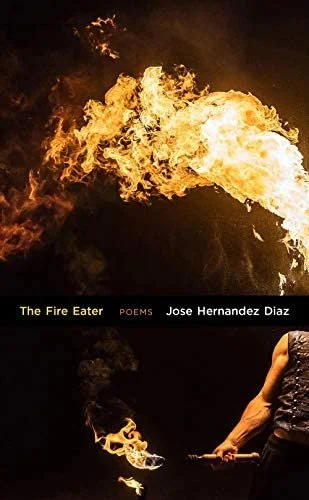"Maybe the Flame Would No Longer Scar His Autumnal Heart: A Review of Jose Hernandez Diaz’s ‘The Fire Eater’" by Jesus Barrera Jimenez
We bestow many connotations on fire—passion, fury, destruction, purification, rebirth, to name a few. NEA Poetry Fellow Jose Hernandez Diaz’s collection of prose poetry, The Fire Eater, dives into each of these motifs in interesting ways that are delightful to read. Through the use of a quintessentially Los Angeles lens, Diaz explores the facets of life that many Angelenos, and perhaps any human with a skeleton inside of them, can relate to in a beautifully simple way. Simple does not mean easy. In fact, Diaz seems to carefully craft his narrative for each piece, purposefully tying imagery and motifs across his body of work, thus making them very accessible to anyone, undead or not. Recognition of these themes comes naturally and perhaps all at once after reading his collection and left me excited to read more of his work.
The book is split into three parts: Part One contains the titular poem of the collection, “The Fire Eater,” a piece about a man performing on Hollywood Blvd. and the 101 on-ramp. This man has been abandoned and left to his own devices and misfortunes, leaving him with a feeling of helplessness that paves its way to hopefulness in at least that moment. Helplessness and hopelessness are feelings that many of us have felt in our lives, especially when we are alone or abandoned. The feelings of doubt and despair often associated with hopelessness are captured beautifully in the lines, ”He counted his lucky stars. One star. Two stars. Three stars. But there was no reason to go on. At least he felt that way at the moment. His family of circus performers had abandoned him. He would have to make it on his own.” The feelings captured in the lines are simple, yet absolute. Loneliness is such a strong feeling that almost everyone has experienced at some point of their lives and, as such, we can relate to this poem almost instantaneously.
The poem is also a very L.A. story, down to the conclusion. Almost at the drop of a hat, the poem shifts to hope. The poem concludes with hopes of fame and recognition. The fire eater hopes to land a spot on America’s Got Talent or a Vegas stage. To be discovered. The trope of being discovered and making it in Hollywood is present and ties the poem together nicely. The final line, “Maybe the flame would no longer scar his autumnal heart,” closes the poem on a hopeful note, leaving the reader with an idea that the fire mentioned is not only the fire he uses to perform, but the fire he has igniting his heart. His hopes and dreams could come to fruition and no longer burn him, but lift him up.
Part 2 of the book introduces the character, the man in the Pink Floyd shirt. This nameless man finds himself in a myriad of interesting situations ranging from being an astronaut, being a successful harmonica player, growing older, witnessing an air traffic accident, and taking a train downtown. Many of these poems have whimsical notes to them, but at their core are extremely relatable. In this sense, we could all be the man or woman in the Pink Floyd shirt—Angelenos going on about their daily lives, going through the motions, existing both in the public and wholly private spheres.
My favorite piece from this section was “The Hole.” In this poem, our hero/heroine takes being told to “go to hell” quite literally and begins to dig a hole in their backyard with the intent of engaging Lucifer in a fistfight. While worried about the outcome, the man in a Pink Floyd shirt considers it a “noble endeavor” and continues to dig until midnight, when he stops his efforts due to exhaustion and falls asleep in the hole. After waking up, the man decides he no longer wants to dig a hole to help and opts to make breakfast instead.
The surreal premise of this poem is ridiculous and lighthearted and feels like something that could possibly have happened in any number of Los Angeles neighborhoods. The matter-of-fact ending of the man giving up on a difficult or impossible goal and opting to have breakfast instead is perfectly encapsulated in the closing line, “Bon appetit, man in the Pink Floyd shirt.”
The final part of the book, Part 3, introduces the skeletons as subjects of the poems. Skeletons have a strong cultural presence in many Latinx cultures, often signifying death, rebirth, family, and afterlife. The poems portray the skeletons as both a group and as individuals, but never give individual names. This was interesting to me because the lack of individuality of the skeletons makes them that much more human, as it is something that is a reality for everyone. The idea that we are all just moving through life in the city only superficially and fleetingly aware of others, while often too aware of ourselves, is captured in these poems. The collection features beautiful imagery that evokes locations in Los Angeles in the mind and describes the day-to-day lives of the skeletons, which made me envious of their seemingly content and productive days.
Jose Hernandez Diaz’s The Fire Eater presents the reader an opportunity to experience Los Angeles in a way that I had not experienced before. The city is not only a setting, but a character in itself. The subjects explored in the poems are not just happening in Los Angeles, but are happening IN Los Angeles, meaning that they are happening in a way that could only happen because they are there. Diaz’s masterful approach to prose left me wanting to take a stab at digging a hole and with a craving for black coffee and cigarettes, another allusion to the old-school-cool of Hollywood and Los Angeles present throughout his poems. Loss, rebirth, hopes, and dreams are all explored in the day-to-day life of the poems’ characters in a uniquely L.A. way that makes me fall in love with the city all over again.
Jesus Barrera Jimenez
Jesus is an Architecture student at Woodbury University. When not stuck in studio, he’s out looking for a new coffee shop or bookstore. He is the fiction / creative non-fiction editor for MORIA’s Issue 10.


